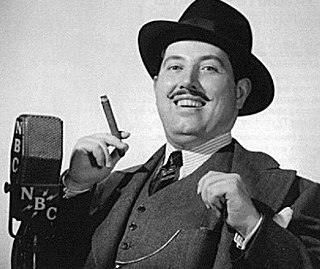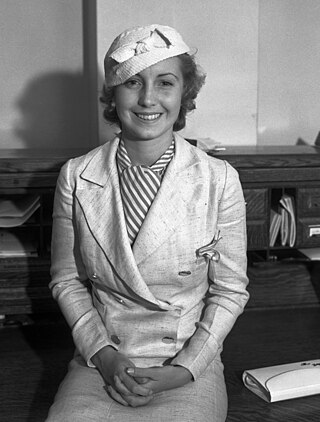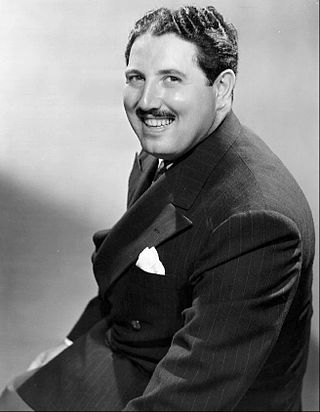Related Research Articles

Fibber McGee and Molly (1935–1959) was a longtime husband-and-wife team radio comedy program.

Arthur Quirk Bryan was an American actor and radio personality. He is best remembered for his longtime recurring role as well-spoken, wisecracking Dr. Gamble on the radio comedy Fibber McGee and Molly and for voicing the Warner Bros. cartoon character Elmer Fudd.

The Great Gildersleeve was a radio situation comedy broadcast in the United States from August 31, 1941 to 1958. Initially written by Leonard Lewis Levinson, it was one of broadcast history's earliest spin-off programs. The series was built around Throckmorton P. Gildersleeve, a regular character from the radio situation comedy Fibber McGee and Molly. The character was introduced in the October 3, 1939, episode of that series. Actor Harold Peary had played a similarly named character, Dr. Gildersleeve, on earlier episodes. The Great Gildersleeve enjoyed its greatest popularity in the 1940s. Peary played the character during its transition from the parent show into the spin-off and later in four feature films released at the height of the show's popularity.

Martha Tilton was an American popular singer during America's swing era and traditional pop period. She is best known for her 1939 recording of "And the Angels Sing" with Benny Goodman.

WNCN is a television station licensed to Goldsboro, North Carolina, United States, serving the Research Triangle area as an affiliate of CBS. Owned by Nexstar Media Group, the station maintains studios on Front Street in north Raleigh, and its transmitter is located in Auburn, North Carolina.

WTRF-TV is a television station licensed to Wheeling, West Virginia, United States, serving the Wheeling, West Virginia–Steubenville, Ohio market as an affiliate of CBS, MyNetworkTV, and ABC. The station is owned by Nexstar Media Group and maintains studios on 16th Street in downtown Wheeling; its transmitter is located in Bridgeport, Ohio.

The Blue Network was the on-air name of a now defunct American radio network, which broadcast from 1927 through 1945.

Harold "Hal" Peary was an American actor, comedian and singer in radio, films, television, and animation. His most memorable role is as Throckmorton P. Gildersleeve, which began as a supporting character on radio's "Fibber McGee and Molly" in 1938.

William Nettles Goodwin, was an American radio announcer and actor. He was for many years the announcer and a recurring character of the Burns and Allen radio program, and subsequently The George Burns and Gracie Allen Show on television from 1950–1951. Upon his departure, he was replaced by Harry von Zell.

The National Broadcasting Company's NBC Radio Network was an American commercial radio network which was in continuous operation from 1926 through 1999. Along with the NBC Blue Network, it was one of the first two nationwide networks established in the United States. Its major competitors were the Columbia Broadcasting System (CBS), founded in 1927, and the Mutual Broadcasting System, founded in 1934. In 1942, NBC was required to divest one of its national networks, so it sold NBC Blue, which was soon renamed the American Broadcasting Company (ABC). After this separation, the Red Network continued as the NBC Radio Network.

The Chase and Sanborn Hour is the umbrella title for a series of American comedy and variety radio shows sponsored by Standard Brands' Chase and Sanborn Coffee, usually airing Sundays on NBC from 8 p.m. to 9 p.m. during the years 1929 to 1948.

Professor Quiz was radio's first true quiz program, broadcast with many different sponsors from 1936 to 1948 on CBS and ABC. The program featured Professor Quiz, his wife Betty, and his son, Professor Quiz Jr. The program's announcer was Robert Trout.

Harlow Wilcox was an American radio announcer.
Philip Morris Playhouse is a 30-minute old-time radio dramatic anthology series.

The Frank Sinatra Show was a title applied—in some cases specifically and in other cases generically—to several radio musical programs in the United States, some of which had other distinct titles as indicated below. Singer Frank Sinatra starred in the programs, some of which were broadcast on CBS, while others were on NBC.

The March of Time is an American radio news documentary and dramatization series sponsored by Time Inc. and broadcast from 1931 to 1945. Created by broadcasting pioneer Fred Smith and Time magazine executive Roy E. Larsen, the program combined actual news events with reenactments. The "voice" of The March of Time was Westbrook Van Voorhis. The radio series was the basis of the famed March of Time newsreel series shown in movie theaters from 1935 to 1951.
Campana Serenade is an old-time radio music program in the United States. It was broadcast on NBC from October 10, 1942 to April 10, 1943, and on CBS from September 4, 1943 to February 16, 1944.
Hollywood Showcase is the title of two American old-time radio talent shows, both of which were broadcast on CBS in the 1930s and 1940s. During some intervals, the program was carried only on CBS's west-coast stations.

The Story of Mary Marlin is an American soap opera radio program. It was broadcast from October 3, 1934, until April 12, 1945, and returned from September 24, 1951, until April 11, 1952. After 1937 it was among the highest-rated soap operas. A version was also broadcast in Australia in 1959-1960.
Ransom M. Sherman was an American actor, radio and television personality and writer. He was an actor, known for the films Are You with It? (1948) and Winter Meeting (1948) and the television series Father of the Bride (1961–1962). He died on 26 November 1985 in Henderson, Nevada, in the United States.
References
- 1 2 3 4 5 6 Dunning, John (1998). On the Air: The Encyclopedia of Old-Time Radio. Oxford University Press. p. 309. ISBN 978-0-19-977078-6.
- 1 2 3 "Hap Hazard Show Renewed". Decatur Herald. January 23, 1942. p. 22. Retrieved May 14, 2022– via Newspapers.com.
- ↑ "On the Air". Harrisburg Telegraph. January 23, 1942. p. 15. Retrieved May 13, 2022– via Newspapers.com.
- ↑ Green, Nat (August 23, 1941). "Chicago" (PDF). Billboard. p. 7. Retrieved May 14, 2022.
- ↑ "Ransom Sherman Opens A Hap Hazard Tonight". The Times. Louisiana, Shreveport. July 1, 1941. p. 14. Retrieved May 13, 2022– via Newspapers.com.
- ↑ "Hap Hazard show gets top rating". The Tampa Times. August 5, 1941. p. 11. Retrieved May 13, 2022– via Newspapers.com.
- ↑ Green, Nat (August 30, 1941). "Chicago" (PDF). Billboard. p. 11. Retrieved May 14, 2022.
- ↑ Curtiss, Bowden (July 1, 1941). "Ransom Sherman Assumes New Role Of Hap Hazard Over WIBA Tonight". The Capital Times. Wisconsin, Madison. p. 15. Retrieved May 13, 2022– via Newspapers.com.
- ↑ "'Hap Hazard" Stays" (PDF). Broadcasting. August 18, 1941. p. 63. Retrieved May 14, 2022.
- ↑ "Fibber McGee to Return Sept. 30 Without Peary" (PDF). Broadcasting. September 29, 1941. p. 20. Retrieved May 14, 2022.
- 1 2 3 "P&G Show Ready" (PDF). Broadcasting. December 29, 1941. p. 29. Retrieved May 14, 2022.
- ↑ "Films Discover Valuable Face—Ransom Sherman". Salt Lake Telegram. June 1, 1942. p. 9. "Hollywood discovered Ransom Sherman, but he's NOT in pictures. He's one of radio's topflight fun-making men, and as he puts it: 'There's one thing certain about a microphone; It doesn't care whether you get a few gray hairs in your head or not.' Here's Sherman and his bellboy, Dix Davis, who plays in his show."